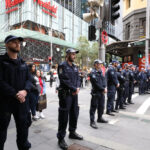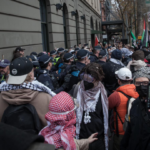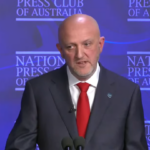Terrorism: Is Giving Police More Power the Answer?

84 people have been murdered and over 100 injured after an armed man drove a truck into a Bastille Day crowd on Friday. 52 people remain in a critical condition and 25 are on life support as a result of the atrocity.
The Muslim man, who was estranged from his wife and children, had recently lost his job and was reportedly mentally ill, drove through the dense crowd for two kilometres before opening fire on the crowd. He was killed by police in a hail of gunshots. The contents of the truck – loaded with guns and grenades – suggest the death toll could have been even higher.
The massacre comes just eight months after 130 people were killed in November’s coordinated Paris attacks. The French government is treating the latest attack as terrorism, and the country’s state of emergency, due to expire on 26 July, will now be extended by three months.
The attacks have raised questions about whether authorities are taking the right approach when it comes to tackling terrorism.
French Approach
French President Francois Hollande has repeatedly declared that the nation is “at war” with terrorists, promising to eradicate the threat.
The previous large-scale attack, which occurred on 13 November 2015, resulted in the deaths of 137 people and injuries to 368. ISIS claimed responsibility for that attack, saying it was in retaliation for French airstrikes on Syria and Iraq.
In response, France declared a three-month state of emergency- banning public demonstrations and giving law enforcement authorities greater powers, including power to search without a warrant, to declare areas out-of-bounds, to monitor communications without a warrant, and to place anyone suspected of terrorism under house arrest without judicial oversight.
Rise of the Right-Wing
At the same time, the popularity of Marine Le Pen, leader of the far-right National Party, has has grown on the back of her hardline national security and anti-immigration stance.
Polls suggest Marine Le Pen is now twice as popular as the current French president, and could win next year’s French election. While Ms Le Pen came a distant third place to current president Francois Hollande and Nicolas Sarkozy in 2012, the French public is angry about the continuing threat of terrorism, and are disenchanted with mainstream politics in general.
More than a quarter of voters say they will give their first preference to Le Pen in next year’s election. A paltry 14% say they will back Mr Hollande – while Mr Sarkozy is favoured by 21% of French voters.
Tackling Terrorism
Many have questioned whether using generalist rhetoric and curtailing civil rights is an effective way of dealing with the threat of terrorism.
Dominique De Villepin, the former right-wing Prime Minister who famously declared that France would not take part in the war on Iraq in 2003, is adamant that “us versus them” rhetoric and the removal of civil liberties is unhelpful.
“It’s not because a band of fanatic murderers declare war on you that you fall into the trap of one-upmanship,” Mr de Villepin warned.
He believes this is particularly true when killers “want to divide us and push our country to civil war”.
According to de Villepin, using general anti-Islamic rhetoric creates an “us versus them mentality”, playing into the hands of extremist groups like ISIS by alienating moderate Muslims, drawing some of them away from the mainstream.
De Villepin says this is exactly what extremist groups want, pointing-out that the vast majority of the world’s 1.2 billion Muslims are law-abiding citizens. He believes the current widespread use of anti-Islamic rhetoric is akin to demonising Christians for the actions of fundamentalist groups like the Ku-Klux Clan or criminals like Adolf Hitler.
Others might highlight the fact that extreme right-wing groups and mass-killers like Charleston shooter Dylan Roof preach Christianity while committing acts of terrorism, yet religion rarely enters political or popular dialogue about the motivation for their crimes.
Still others might point out that the vast majority of people murdered by extremist groups like ISIS and the KKK belong to the same religion as their killers – further undermining the credibility of “us versus them” rhetoric which points the finger at a particular religion rather than extremism.
Lessons from Norway
In 2011, Anders Breivik killed 77 people outside Norway’s government buildings in an attack attributed to his extreme right-wing beliefs, including his disdain for immigrants and multiculturalism.
Norwegian Prime Minister, Jens Stoltenberg, was determined not to respond to the atrocity by eroding the protections of the law.
“We are still shocked by what has happened, but we will never give up our values,” Stoltenberg has said.
“Our response is more democracy, more openness, and more humanity.”
Norway, he decided, will “not seek vengeance as America had done after the 9/11 attacks. We will answer hatred with love”.
The alleged perpetrator, Mr Breivik, was treated no differently to any other suspect. He was given legal representation, protected from cruel and unusual punishment and retains the right to appeal the 5 year extensions to his 21-year prison sentence one his minimum term has expired.
Norway did not declare a state of emergency, did not increase maximum penalties for criminal offences and did not engage in the wholesale removal of legal protections and safeguards; as has occurred in many other countries, including Australia.
The Prime Minister was determined not to make Breivik a “martyr” and “give him exactly what he want[ed]” by passing laws on the back of his atrocious crime.
While Stoltenberg was criticised internationally, the Norwegian people ultimately embraced his decision. Support for Norway’s anti-immigration ‘Progress Party’ dropped from 17.5% to 11.4% while the Labor Party’s popularity increased from 31.6% to 29.6%.
Significantly, commentators suggest Norway’s decision may have made the country safer rather than more dangerous by not playing into the hands of extremists, or demonising and thereby alienating moderates.







